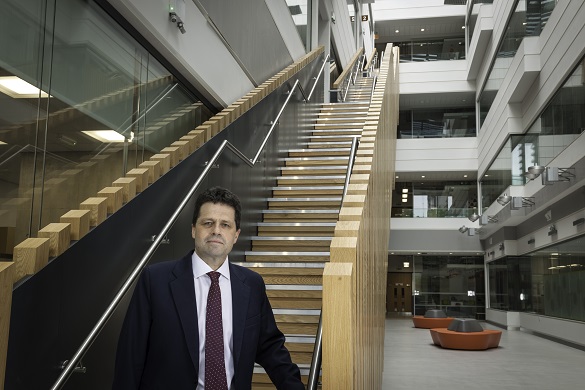
Professor Matt Rosseinsky, from the University’s Department of Chemistry and Materials Innovation Factory, has won the 2023 Eni Energy Frontiers Award for the digital design and discovery of next-generation energy materials.
A globally-prestigious prize for research in the fields of energy and environment, previous Eni Award winners include Nobel laureates such as Harold W. Kroto and Alan Heeger.
Professor Rosseinsky’s research is pushing new boundaries in how new energy materials are designed and discovered through the use of digital tools.
For the past 50 years, the scientific approach to designing materials for the energy devices and manufacturing processes used every day has been based on chemical synthesis, guided by understanding of structure-property-composition relationships and the properties expected for that structure. More recently, this approach has been augmented by ground-breaking advances in computation based on physics-based models and on machine learning from experimental data.
A new digital approach to materials discovery
Professor Rosseinsky and his team of colleagues, postdoctoral researchers and research students have developed an approach that fuses new digital tools with the experimental exploration of uncharted chemistry to produce new energy materials.
This is demonstrated by the digitally-driven experimental realisation of new types of materials structure, the discovery of an outperforming material by fusing structure prediction with machine learning of properties, and the engineering of thermal transport by synthesis of solids with three anions with distinct structural roles.
The digital approach to making outperforming materials in the laboratory, which are distinct from any existing precedents, signals a new path to materials discovery. This new capability to discover and design the new materials is essential to meet the critical challenges facing society, such as a growing population and climate change.
He said: “I am delighted to receive the 2023 Eni Energy Frontiers Award. The work it recognises was performed by an outstandingly talented group of postdocs, students and colleagues here at Liverpool and our collaborators around the world, spanning academia and industry across physical and computer science.
“I hope that it will focus attention on the importance of developing our understanding of the chemistry and physics of materials using all the tools we can build to create a sustainable future for our society.”
Professor Rosseinsky will receive the award at a ceremony in Rome’s historic Quirinal Palace this autumn in the presence of the President of the Republic of Italy.
Professor of Inorganic Chemistry at the University of Liverpool and a Fellow of the Royal Society since 2008, Matt Rosseinsky became a Royal Society Research Professor in 2013 and has won the Royal Society’s Hughes Medal and the Davy Medal for his research.
The Eni Award is a prize awarded by the Italian oil and gas company Eni with the aim of encouraging better use of energy sources and increased environmental research. The award guidelines and the notable names on the selection committee (including Nobel laureates) make Eni Energy Frontiers Award a coveted prize. It has been referred to by some websites and magazines as the “Nobel prize of energy research”.